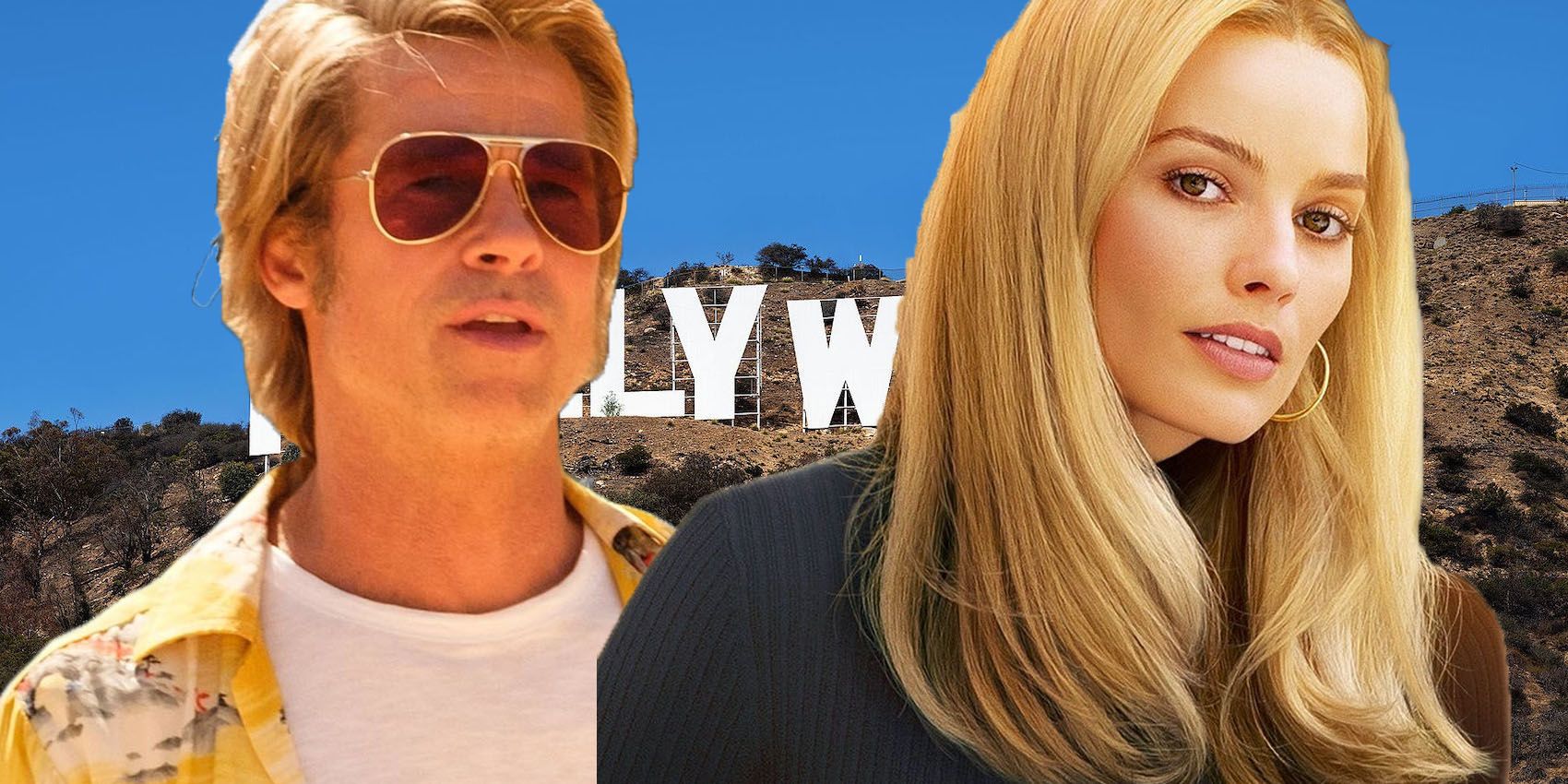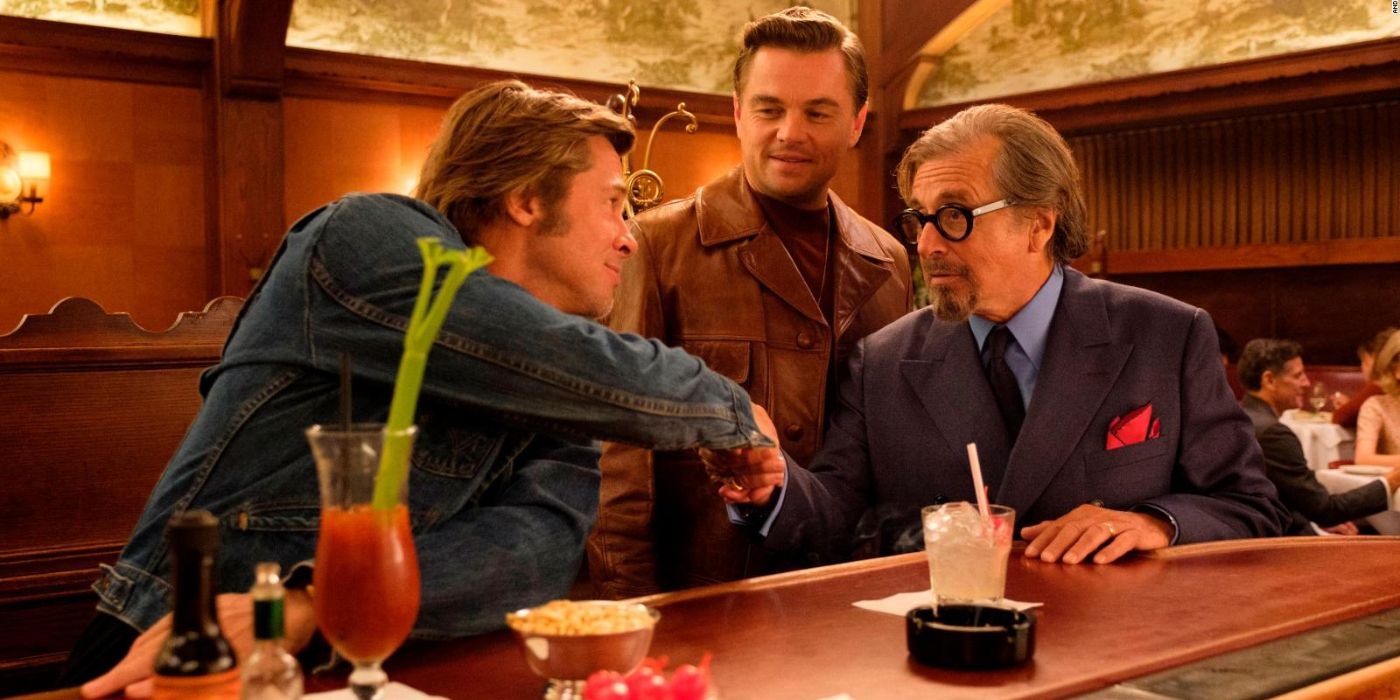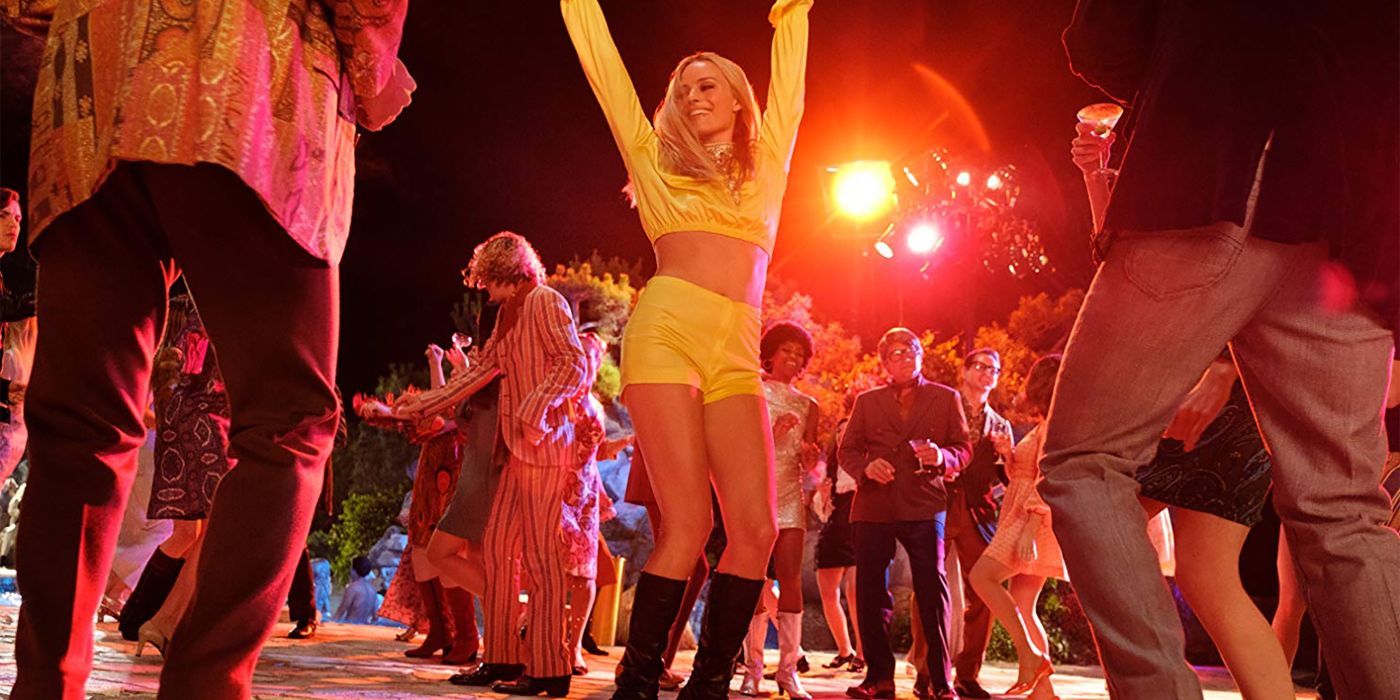Quentin Tarantino’s 2019 comedy-drama film Once Upon A Time In Hollywood is seen by many as a love letter to Hollywood, featuring multiple characters and interwoven storylines that highlight Hollywood in the late-60s. However, despite the widely-held conclusion that Once Upon a Time in Hollywood is approbative of the movie business, the way Tarantino builds the characters and their conflicts suggests the film may also serve as a criticism of his beloved industry.
Once Upon A Time In Hollywood is set in 1969 Los Angeles and features an all-star cast led by Leonardo DiCaprio, Brad Pitt, and Margot Robbie. The story follows an actor Rick Dalton (DiCaprio) and his stunt double and best friend Cliff Booth (Pitt) as they navigate the changing film industry, coming in contact with the Manson family along the way, all while Sharon Tate (Robbie) and her friend Jay Sebring (Emile Hirsch) do the same. The plot reads like a modern fairytale, weaving each character’s narrative together to build a multifaceted look at the movie business and Hollywood in the 60s.
Critics frequently tout Once Upon A Time In Hollywood as being a film made for movie-lovers by a movie-lover, and while that may be true, it misses a lot of the film's nuanced criticism of the movie business. A close reading of the characters reveals that the people who populate the film industry are less laudable than they first appear to be.
Every Character In The Hollywood System Is Fake or Insecure
Quentin Tarantino highlights the problems in Hollywood and the movie business by building characters that represent a variety of movie industry people, all of whom seem to be fake, insecure, or problematic in some way with very few exceptions. The first, most obvious example of this is Leonardo DiCaprio’s character, Rick Dalton, who serves as the foil to Cliff. Dalton is a veteran Hollywood actor and star of the 1950s Western television series Bounty Law, but he’s worried that his career is on the decline. When his casting director suggests he go to Italy to make spaghetti westerns, Dalton scoffs, feeling that these films are beneath him, but he goes anyway as he desperately fears falling into obscurity.
Through the course of the film, Dalton has a breakdown when he can’t remember his lines and throws a fit in his trailer. He also lusts after the lives of Sharon Tate and Jay Sebring who live next door to him in the Polanski mansion, desperately wishing to become a part of their inner circle where he believes he can revive his failing career. Every action he takes throughout the story shows the audience his desperation for relevance and terrible insecurity as he watches his career dwindle.
The next example is Marvin Schwarz, played by Al Pacino, who is a movie agent. He meets with Rick Dalton to give him some career advice. While he’s very kind to Rick Dalton and gives him compliments on pictures he’s done in the past, he highlights the attitude of many in the film industry that believe actors have a shelf-life. He tells Dalton essentially, that his best years are over and that if he keeps playing villains in these guest roles, then no one will ever hire him to be a star again, and audiences won’t find him sympathetic in other films.
Another example of Hollywood criticism is the character of Bruce Lee, played by Mike Moh. Lee represents the arrogance of Hollywood stardom, treating everyone else on set as lesser than himself, and refusing to pull his hits, he injures a stuntman. When Cliff Booth confronts Lee's arrogance, the two fight, and despite fans expecting Lee to easily handle the older Cliff, the fight is essentially a draw, sparking questions about the accuracy of Lee's boasts.
In an homage to his role as the murderous, misogynistic stuntman, Mike, in Tarantino’s Death Proof, Kurt Russell plays Randy Miller, one half of a stunt coordinating duo, the other half being his wife, Janet (Zoe Bell). Cliff originally approaches Randy for a job on the set of The Green Hornet, and while Randy is reticent, he ultimately decides to give Cliff a chance despite knowing his wife will be angry if she finds out. However, after Cliff's fight with Lee, Randy throws Cliff off the set. Though it can be argued that Cliff was a troublemaker and interfered with production, Randy's reticence isn't about Cliff's actions; Randy is responding to fear of Janet's reprisal, representing a form a cowardice and insecurity.
Cliff and Sharon Are the Exceptions
The only exceptions to the rule of characters standing for negative traits in Hollywood are Cliff Booth and Sharon Tate. Sharon Tate represents a pure love of the art, going to the movie theatre just to see her own movie. While this could be seen as simple vanity, it’s clear from her behavior at the theatre that she just loves the movies and wants to experience everything about them as much as possible. She laughs at herself playing the klutz in The Wrecking Crew opposite Dean Martin. She’s sweet, smiling, and grateful for her life throughout the course of the film, clearly not a Hollywood star, but absolutely happy just to be in the industry.
Cliff Booth, on the other hand, represents the hyper-masculinity that Quentin Tarantino loves. He’s a war veteran skilled in hand-to-hand combat, who lives a simple life in a trailer with his dog. He struggles to get work because people think he killed his wife, but doesn’t seem to mind much, living his life regardless of anyone’s interference. He tries to do right by everyone he can, refusing Pussycat's (Margaret Qualley) sexual advances and pushing to check in on George Spahn (Bruce Dern) when he discovers the Manson family out on his ranch, but Cliff also doesn’t allow himself to be denigrated without retaliation, getting into fights both at the ranch and on a movie set with Bruce Lee. Overall, Cliff is the stoic cowboy, a real example of the person that all the Hollywood characters are pretending to be, and it is significant that he could take or leave Hollywood's trappings.
By cordoning off these two characters as the only genuine people in the film, Tarantino criticizes the Hollywood system as full of falsity and insecurity, always on the verge of being found out, and he presents Sharon and Cliff as the alternatives to the system: one who loves art and the other who doesn't need to pretend to have stoic strength. It is significant, then, that Once Upon a Time In Hollywood's ending diverges from reality: rather than Sharon dying at the hands of the Manson family, who claim that movies have “taught them to kill,” as Squeaky Fromme (Dakota Fanning) says, Sharon lives, and the killers are gruesomely dispatched by Cliff and Rick. In this way, Tarantino offers a fantasy alternative to reality, one in which love of art and genuine strength prevail.



